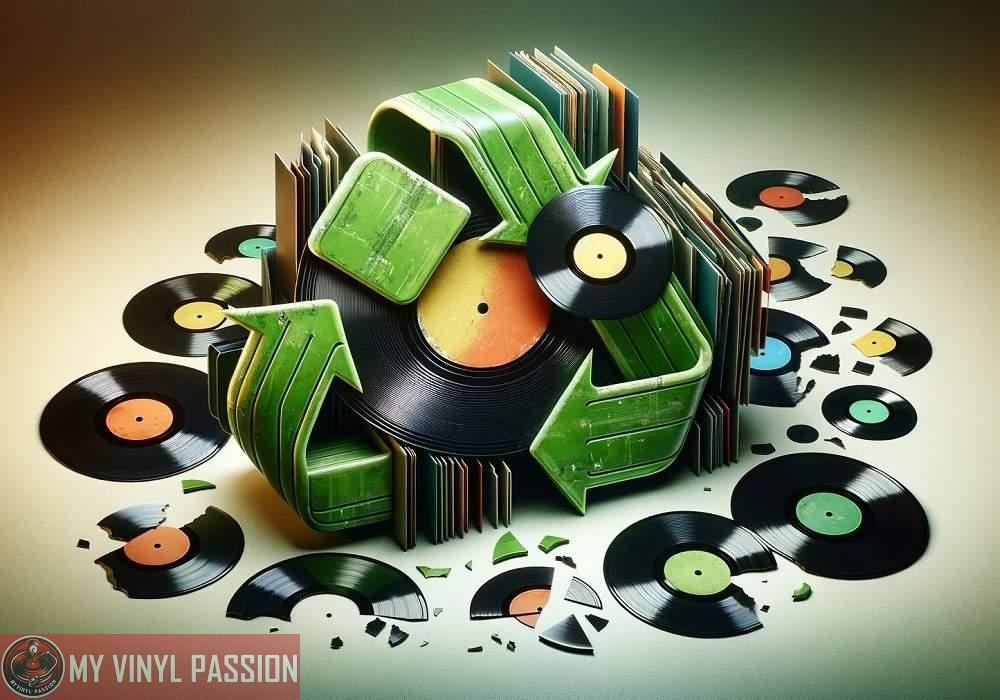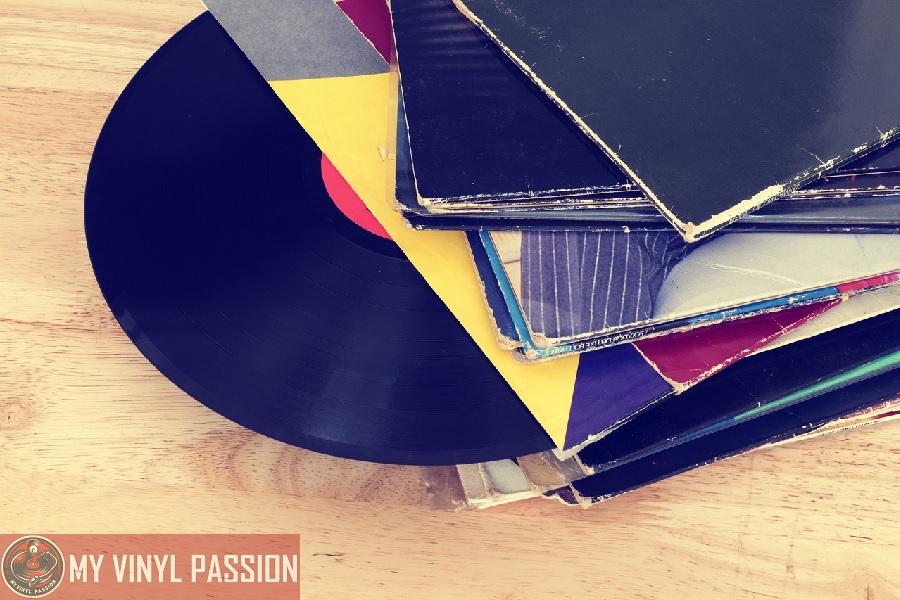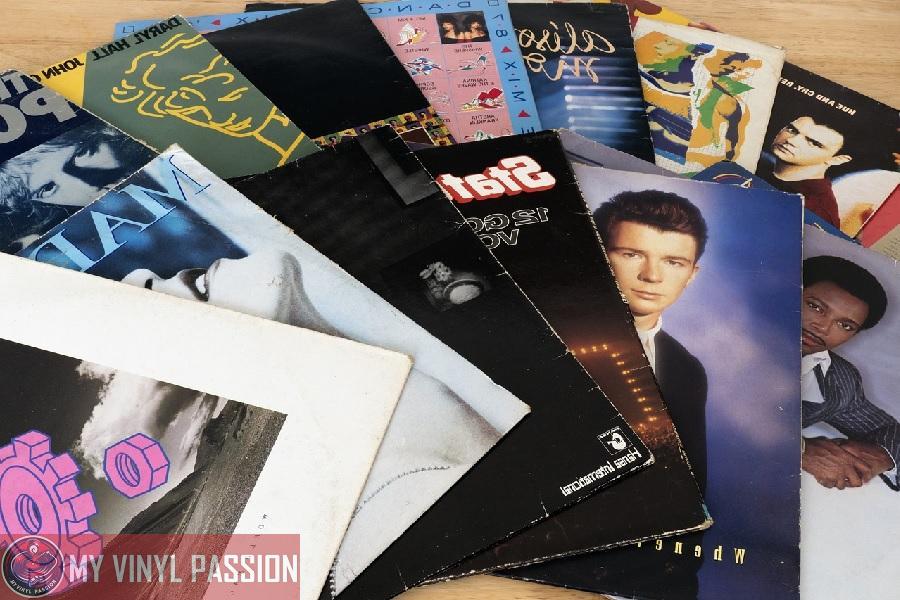In recent years, there has been a resurgence in the popularity of vinyl records, with collectors and music enthusiasts appreciating the medium for its unique sound quality and nostalgic value.
However, an important question arises: are vinyl records recyclable?
Considering the increasing global emphasis on sustainability and the management of waste, it’s crucial to understand whether these cherished music discs can be part of an eco-friendly lifecycle.
While the vinyl discs themselves are challenging to recycle due to the nature of PVC, efforts can be made to repurpose or responsibly dispose of them.
In Summary
Vinyl records are difficult to recycle due to harmful chemicals released during the process and require specialized facilities for recycling.
Their cardboard and paper packaging can typically be recycled, provided it’s free from non-recyclable contaminants.
Vinyl records, due to their PVC composition, present environmental challenges, including long-term waste in landfills and the potential release of harmful chemicals.
Attempting to recycle vinyl records is not as straightforward as recycling paper or plastic.
Vinyl records are made from polyvinyl chloride (PVC), a plastic that is notoriously difficult to recycle due to the presence of chlorine and additives, which can release harmful chemicals during the recycling process.
PVC requires specialized handling, and not all recycling facilities are equipped to process it, leading us to seek alternative methods for dealing with unwanted or damaged records.
We recognize that the sustainability of vinyl records extends beyond just the material they’re pressed from. The packaging, often made from cardboard and paper, can typically be recycled, provided it’s free from plastic shrink wrap and other non-recyclable contaminants.
When considering the recyclability of vinyl, the entire package must be taken into account, encouraging us to think holistically about our consumption habits and the lifecycle of the products we cherish.
Vinyl Records and the Environment
In our exploration of environmental impacts, we recognize that vinyl records have both a cultural and ecological footprint.
Traditionally, these records are produced from polyvinyl chloride (PVC), a plastic that is not easily recyclable due to its composition and the complexity of the record’s construction, which includes various materials.
Our records’ durability can be a double-edged sword. On the one hand, vinyl’s longevity helps to reduce the need for frequent replacements, curbing consumption. Yet, their resilience also means they do not break down quickly in landfills, posing a significant environmental challenge.
We understand that the production process of vinyl records involves energy use and chemical byproducts, contributing to our environmental impact.
There is a growing awareness about using more sustainable practices, such as pressing records from recycled vinyl, although the sound quality might differ from that produced with virgin materials.
Efforts in improving the environmental track record of institutions, including those involved in the music industry, should be noted.
Here are some recognized efforts for reducing the impact of vinyl records:
- Recycling Programs: Specific facilities accept vinyl records for repurposing into new products.
- Alternative Use: Creative individuals find various ways to reuse records, giving them a second life.
- Energy Reduction: Some producers invest in renewable energy to power manufacturing processes.
We acknowledge that while recycling vinyl records poses challenges, through community dedication and the music industry’s evolving practices, we strive to lessen our environmental imprint.
Materials Used in Vinyl Record Production
Vinyl records are primarily composed of a plastic known as polyvinyl chloride (PVC), which provides the necessary durability and grooves for sound reproduction.
Our focus here is to examine the materials and proper crafting of a vinyl record.
PVC and Other Plastics
PVC is the main material used in the production of vinyl records. It’s chosen for its ability to be easily molded and for its durability, which is important for the creation of the record’s grooves.
While PVC comprises the bulk of a record, other plastics may also be incorporated during manufacturing for specific properties, such as improved strength or flexibility.
- Primary plastic: PVC (Polyvinyl Chloride)
Additives and Their Roles
During the production of vinyl records, various additives play essential roles in enhancing the physical and audible qualities of the record. These include:
- Stabilizers: To prevent degradation of the PVC when exposed to heat or light.
- Plasticizers: To ensure the PVC remains flexible and does not become brittle over time.
- Fillers: To improve strength and possibly to reduce cost.
- Pigments: Generally black for vinyl records, used to color the PVC.
Each of these additives has a specific purpose, ensuring that our vinyl records not only sound good but also withstand the test of time.
Recycling Process of Vinyl Records
In our exploration of the recycling process of vinyl records, we aim to understand the potential for repurposing these materials and the inherent complexities.
Feasibility of Recycling
Vinyl records are primarily made from PVC (polyvinyl chloride), which in theory, can be recycled. During the recycling phase, vinyl records can be ground down into small pellets, which are then repurposed to manufacture new items.
The process involves several steps: collecting the vinyl, sorting it by quality, cleaning to remove any impurities, and then processing it into a form that can be molded into new products.
The use of recycled material is not without precedent, as seen in the music industry with the production of V-Discs during World War II, suggesting a historical context for the recycling of vinyl records.
Challenges in Recycling Vinyl
One of the main challenges in recycling vinyl records is the potential degradation of sound quality when using recycled vinyl. Records produced from virgin vinyl are often favored for their superior sound fidelity. This preference can diminish the market for recycled vinyl products.
Furthermore, issues such as the presence of labels and the fact that records are often mixed with different materials complicate the recycling process. The separation of those materials can be a tedious and costly procedure, requiring specialized equipment and processes that can handle the sorting and cleaning of the vinyl effectively.
Alternatives to Recycling
When we look beyond traditional recycling, we uncover creative and beneficial ways to extend the life of vinyl records.
Repurposing and Upcycling
We often find that vinyl records can be transformed into art or new functional items. By repurposing, we give records a second life, possibly as decorative pieces, like wall art, or practical objects, such as bowls and clocks. This process not only preserves the unique aesthetic of vinyl but also encourages innovative design.
Donation and Reuse Options
We explore donation to give records fresh purpose. Local libraries, thrift stores, and schools frequently accept vinyl donations, and there are online platforms that facilitate the exchange or sale of vinyl records. These methods ensure that the music and the medium live on, reaching new audiences and appreciators.
Impact of Improper Disposal
When we discuss the environmental ramifications of improperly discarding vinyl records, we must address several concerns.
Non-biodegradable Waste: PVC is non-biodegradable. When vinyl records end up in landfills, they take an indefinite period to break down, leading to an increase in long-term waste accumulation.
Chemical Release: As vinyl records degrade over time, especially under improper disposal conditions, they can leach chemicals into the soil. This can contribute to soil and groundwater pollution, posing risks to wildlife and potentially affecting human health.
- Toxic Emissions: During incineration, which is sometimes used as a method of waste disposal, vinyl records can release hazardous chemicals such as dioxins and hydrochloric acid.
- Resource Inefficiency: By neglecting to recycle or repurpose vinyl records, we waste valuable resources. The production process requires energy and raw materials that could be conserved if recycling pathways were implemented.
We must be mindful of the potential for negative impacts on ecosystems and public health due to the release of harmful substances. These outcomes emphasize the importance of seeking environmentally sustainable methods for managing vinyl records at the end of their lifecycle.
Legislation and Industry Standards
In addressing the recyclability of vinyl records, we must consider both the legal framework and the sector’s adherence to sustainable practices. Our focus lies on the environmental laws that govern recycling and the common recycling strategies implemented by the industry.
Environmental Regulations
Environmental legislation influences how we recycle vinyl records. While the concept of a closed loop recycling system for vinyl is ideal, the responsibility can be transferred from record labels if certain recycling steps are outsourced.
This demonstrates a gap in legislation where the responsibility for recycling may not clearly fall on any particular party in the product lifecycle. Nevertheless, comprehensive environmental policies are essential as they guide our recycling efforts and ensure adherence to sustainable practices.
Industry Recycling Practices
In practice, the recording industry has adopted various recycling measures.
Vinyl records pose a unique challenge due to their material composition, but recycling is viable with proper technology and processes. We observe that recycling effectiveness in the industry varies with the presence of local vs. national legislation.
For instance, some regions might only have state and local government regulations leading to inconsistent recycling rates, as in the case of plastics recycling. Steel, by contrast, is highly recycled across the world, demonstrating that industry recycling practices can significantly impact material reuse when recycling is economically feasible.
Advancements in Eco-Friendly Production
In recent years, we’ve witnessed a promising shift towards eco-friendly practices in the production of vinyl records.
Our industry’s focus includes reducing waste and improving recyclability. We’re exploring materials that lessen environmental impact without compromising the cherished sound quality of vinyl.
Recyclable Materials: We’re utilizing more biodegradable compounds and recyclable plastics to press records. This pivot is crucial in minimizing vinyl’s footprint, as traditional PVC is challenging to recycle.
Innovative Techniques:
- We’re integrating plant-based bioplastics, which are far more sustainable.
- Some of us have adopted a closed-loop water system to conserve resources during the manufacturing process.
Improved Energy Usage: We’ve made strides in energy conservation. Our plants are increasingly powered by renewable energy, which significantly cuts down on carbon emissions.
Table: Breakdown of Energy Sources in Vinyl Production
| Renewable Source | Percentage Usage |
|---|---|
| Solar | 30% |
| Wind | 25% |
| Hydro | 20% |
| Geothermal | 15% |
| Biomass | 10% |
Packaging Advances:
- Shift to recycled cardboard and biodegradable shrink wrap
- Introduction of reusable sleeves to enhance the lifespan and reduce waste
We’re committed to fostering a culture of sustainability within our community. By investing in research and new technologies, we are steadily moving towards a more eco-friendly vinyl record production process that aligns with our environmental responsibilities.
Consumer Responsibility and Best Practices
As avid music enthusiasts and environmentally conscious consumers, we have a shared responsibility when it comes to recycling vinyl records. Although vinyl records can be difficult to recycle due to their PVC material, there are best practices we can adopt to minimize our environmental footprint.
Understand the Material: Most vinyl records are made of Polyvinyl Chloride (PVC), which is a plastic not readily accepted by standard recycling programs due to its chlorine content and potential to release harmful chemicals during the recycling process.
Local Recycling Programs: We should first check with our local recycling facilities to see if they accept PVC or vinyl records. Although it’s rare, some specialized facilities have the capacity to recycle this type of plastic.
- If they do accept, ensure vinyl records are clean and free from paper, sleeves, and covers as these materials are recycled differently.
Upcycling and Repurposing: One of the best practices we can engage in is upcycling old vinyl records into new items.
- Ideas for Upcycling:
- Coasters
- Bowls
- Wall art
Donation: If the records are still playable, consider donating them to local thrift stores, schools, or music programs.
- Donating gives records a:
- Second life
- Reduces waste
Artist Support: Support artists and labels that offer music in environmentally friendly formats or packaging.
- Choose digital downloads or CDs, which can be easier to recycle, when possible.
By following these steps, we actively participate in reducing waste and promoting sustainability within our music-loving community. It’s about making informed choices and seeking creative solutions to give our cherished tunes a new lease on life, beyond the turntable.
FAQs
Can vinyl records be recycled through regular municipal recycling programs?
No, vinyl records typically cannot be recycled through standard municipal recycling programs due to their PVC composition, which requires specialized handling.
What makes vinyl records difficult to recycle?
Vinyl records are made from polyvinyl chloride (PVC), a type of plastic that releases harmful chemicals during the recycling process. Additionally, the presence of labels and adhesives adds complexity to recycling.
Are there any facilities that specifically recycle vinyl records?
There are specialized facilities that can recycle PVC, but they are not common. Some local or private recycling programs might accept vinyl records, but this is not widespread.
What can be done with old or unwanted vinyl records?
Instead of recycling, old or unwanted vinyl records can be repurposed or upcycled into new items like art, coasters, or decorations. They can also be donated to thrift stores, libraries, or schools.
Is the packaging of vinyl records recyclable?
Yes, the cardboard and paper packaging of vinyl records are generally recyclable in standard recycling programs, as long as they are free from plastic shrink wrap and other non-recyclable materials.





